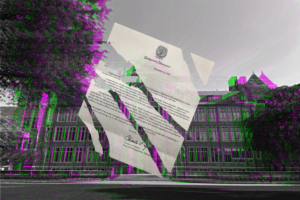The COVID-19 pandemic had huge impacts on education from kindergarten all the way up to college. Data obtained by the National Center for Education Statistics (NCES) shows that 87% of US public schools reported that the pandemic has negatively impacted student behavior. In addition to this, the pandemic has also affected the consideration of standardized test scores in college applications. With test centers shutting down due to the pandemic, most colleges and universities across the country, including Georgetown, instated test-optional policies beginning in the Fall 2020 admissions cycle. While many of these institutions have maintained these policies, Georgetown has since returned to requiring prospective students to submit their SAT or ACT scores as part of their application. However, this move is contrary to many of the Jesuit values that Georgetown claims to uphold, and the university should revert back to a test-optional admissions policy.
Firstly, SAT and ACT scores are strongly correlated with one’s socioeconomic status. A 2015 analysis conducted by Insider Higher Ed found that for all three sections of the SAT (reading, writing, and math), the lowest average scores came from students whose families earned less than $20,000 a year. Meanwhile, the highest average scores came from students whose families earned more than $200,000. This trend of higher-income students, on average, getting higher scores has persisted: the 2022 SAT Suite of Assessments Annual Report published by the College Board (the administrators of the SAT) showed that the average score of a student from the lowest quintile of median family income ($0 – $51,591) was 914, and the average score of a student from the highest quintile of median family income (>$110,244) was 1161.
This correlation can mainly be attributed to the cost of taking these standardized tests and the extra academic support available to higher-income students. The registration fee for the SAT and ACT is $60 and $68, respectively, and while fee waivers are available for low-income students, these costs can prevent many students from taking the test more than once. On the other hand, students from families with higher incomes can afford to take these tests more than once to improve their scores. Wealthier students are also more likely to attend better-funded schools and be able to pay for tutors and prep classes. Furthermore, as seen in the College Board’s annual report, the same correlation between SAT/ACT scores and family income also exists in relation to race and ethnicity. In other words, those from underrepresented minority groups, who on average are also from lower socioeconomic statuses, tend to have lower scores on these standardized tests.
With Georgetown’s Jesuit values, particularly “Community in Diversity,” it is surprising to me that they have continued to require students to submit standardized test scores for admission consideration. Georgetown claims to promote “…a rich and growing diversity of faith traditions; racial, ethnic, and gender identities; and the varieties of cultural heritages represented by our students, faculty, and staff.” However, in requiring SAT/ACT scores, Georgetown is limiting the applicant pool to students whose scores are in the top percentiles. Given the demographic factors in standardized testing, this means they are effectively putting many students from low-income and minority groups at a disadvantage. How will Georgetown be able to embody the value of “Community in Diversity” if they are instating policies that restrict a diverse applicant pool?
This question is especially important after the decisions in the Students for Fair Admissions v. Harvard and the Students for Fair Admissions v. UNC cases where the Supreme Court effectively ended affirmative action. Without being able to consider race, ethnicity, geographic location, etc., along with requiring test scores, Georgetown will inevitably face difficulties in building a diverse environment for its students. Additionally, ignoring the socioeconomic factors in standardized testing conflicts with Georgetown’s cura personalis, which preaches being aware of one’s “…unique circumstances and concerns, and their particular gifts and limitations, to encourage each person’s flourishing.”
Not only are these test-required policies restrictive towards low-income and minority applicants, but cura personalis is also at odds with mandatory test score submission due to the role of test anxiety regarding standardized tests. Between 10-40% of students experience some level of test anxiety, and intuitively, the more test anxiety one has the lower they perform academically. Even if a student has excellent extracurricular activities and many awards and achievements, the overwhelming and uncontrollable stress and anxiety that they may experience when taking tests, especially those as important as the SAT and ACT, can be too much for them to handle. This could cause them to obtain an SAT or ACT score that does not accurately reflect their true potential.
Given the seemingly uncontrollable factors that affect one’s SAT/ACT score, it is surprising to see how much emphasis Georgetown’s admissions committee places on these tests. In their 2022-2023 Common Data Set, Georgetown places “Standardized test scores” under the “Very Important” category when making first-year admissions decisions. By simply communicating their emphasis on standardized testing and forcing prospective students to submit a score from a single three-hour exam, Georgetown is essentially disregarding students’ unique circumstances, such as socioeconomic status or having test anxiety, which goes against their own values such as cura personalis.
Some still argue that test scores allow admissions officers to assess college readiness and that removing them as a requirement will severely lower academic performance on college campuses. For example, billionaire Michael Bloomberg claims that reinstating test-required policies will promote high school accountability and guarantee that students are ready for college. While the research around this is primitive, there doesn’t seem to be a meaningful difference in academic performance between students admitted with test scores versus students admitted without them.
In fact, an analysis of 1700 campuses, some of which were test-optional from 2008-2016, actually found slightly higher first-year retention rates among schools with test-optional policies. These higher retention rates, which is a common indicator used by rankings such as the US News and World Report college rankings to evaluate academic performance, suggests that test-optional or not, colleges will still be able to maintain their academic excellence. In fact, many elite universities including the Ivies actually became more selective and prestigious due to their test-optional policies. At Georgetown, I have become friends with so many intellectually driven and interesting people whose intelligence defies anything that could be measured by the SAT or ACT. While standardized test scores might measure how good one is at test-taking, they do not seem to accurately reflect one’s overall intelligence. It would therefore be illogical for colleges to determine an applicant’s excellence simply based on a single test score.
All in all, if Georgetown truly wants to embody its values of “Community in Diversity” and “Cura Personalis” and create an ethnically and socioeconomically diverse student body in the absence of affirmative action, it is essential for them to abandon their test-required policy and give the students the choice to submit or not submit their SAT/ACT scores.






